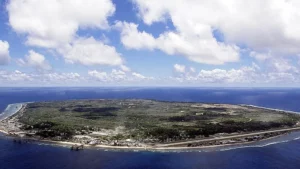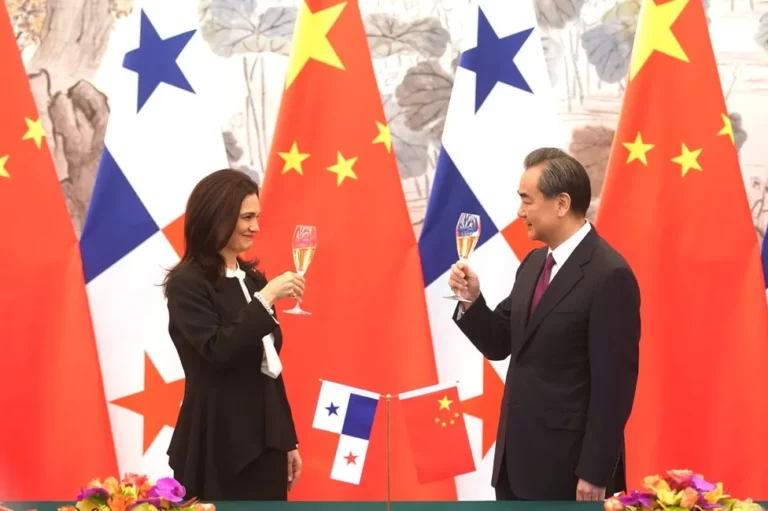NIN365 Desk, Kolkata : In a diplomatic cliffhanger that has the world on edge, Nauru, a tiny Micronesian island and one of Taiwan’s last-standing allies, has sent shockwaves through international relations by abruptly cutting ties with Taipei. The unexpected move comes mere days after the people of Taiwan elected William Lai as their next president, a decision Beijing views with a critical eye.
Election Sparks the Powder Keg:
The recent Taiwanese election stirred the pot as voters chose Lai, a pro-sovereignty candidate unafraid to challenge China’s stance on Taiwanese independence. Beijing, quick to brand Lai a “troublemaker,” wasted no time flexing its diplomatic muscles. The Nauru bombshell adds an intriguing layer to the already complex dynamics between Taiwan and China.

China’s Strategic Chess Moves:
Observers speculate that Beijing’s influence played a pivotal role in Nauru’s sudden shift. While Taiwan alleges that China took advantage of Nauru’s political fluctuations, Beijing rejoices in Nauru’s decision, declaring it as a testament to the “one-China principle.”
Diplomatic Poker:
Taipei’s deputy foreign minister, Tien Chung-kwang, doesn’t mince words. He accuses China of using “despicable methods” and asserts that the world is closely watching Taiwan’s democratic development. The timing, he claims, is not merely a reaction to democratic elections but a direct challenge to the international order.
Nauru’s History of Flip-Flopping :
Nauru’s diplomatic waltz isn’t new. In 2002, it made a similar pivot towards China, only to reconcile with Taiwan in 2005. Analysts argue that the latest move was on the cards for a while, as China consistently seeks to erode Taiwan’s influence, especially in the Pacific.
Australia’s Climate Treaty: A Warning Sign?
Australia’s swift action in pursuing a treaty offering climate refuge to Tuvalu citizens late last year raised eyebrows. It reflected concerns that Pacific nations, including Tuvalu and Nauru, were under pressure to align with China. The strategic chess game intensifies as China extends its reach, leaving nations to navigate treacherous diplomatic waters.
Global Implications:
As Taiwan finds itself with fewer diplomatic allies, each loss becomes more significant. Mihai Sora, a research fellow at Australia’s Lowy Institute, emphasizes China’s continuous efforts to erode Taiwan’s sovereignty. With global attention focused on this diplomatic dance, questions arise about the future of Taiwan’s position in the international arena.
The Urgency for Democratic Solidarity:
Taipei remains on high alert, ready to counter any further moves by China to isolate Taiwan. Tien Chung-kwang’s defiant stance underscores the urgency for democratic nations to stand in solidarity against what Taiwan perceives as China’s attempts to undermine the democratic order.
The Pacific as a Battleground :
The Pacific emerges as a key battleground in this diplomatic struggle. Small nations, seeking development gains, become pawns in a larger geopolitical game. China’s assertiveness in the region leaves Taiwan with a shrinking space for international recognition.
What’s Next for Taiwan?
As the international community grapples with the implications of Nauru’s decision, Taiwan faces a critical juncture. The island nation must navigate the delicate balance between asserting its sovereignty and preserving diplomatic ties in a world where the geopolitical landscape is ever-shifting.
Conclusion :
Nauru’s diplomatic pivot is a vivid reminder of the complex dance between nations in a world where alliances are constantly tested. As Taiwan fights to maintain its standing on the global stage, the international community watches with bated breath, wondering how this diplomatic drama will unfold and what it means for the future of Taiwan’s autonomy.
DISCLAIMER
Our news media denounces any form of bias and disapproves of sensationalism. The disseminated news is entirely educational and aimed at social awareness. Our media maintains absolute impartiality, adhering solely to the purpose of education and social consciousness.


